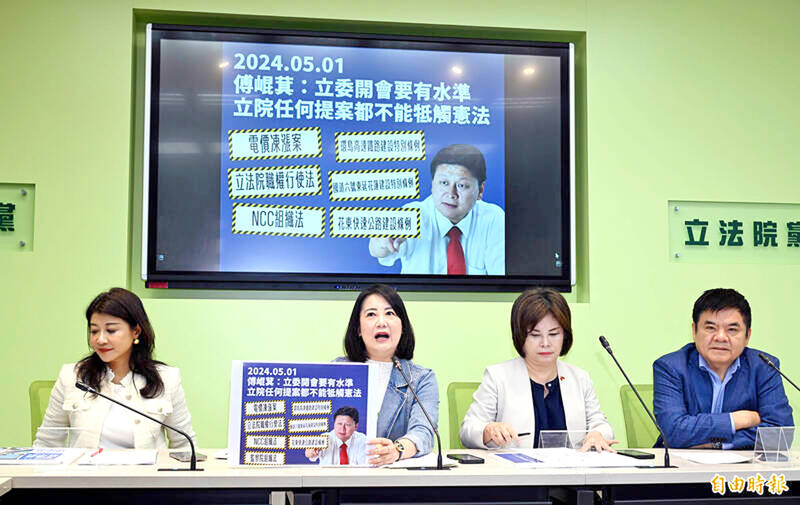Members of the Democratic Progressive Party (DPP) and Taiwan Statebuilding Party (TSP) yesterday accused Chinese Nationalist Party (KMT) caucus whip Fu Kun-chi (傅?萁) of trying to nullify security laws and undermine national sovereignty in the legislature after returning from China.
Fu led 16 KMT lawmakers and a number of party officials on a visit to China earlier this week, and soon after returning has been vigorous in his efforts to amend the Anti-Infiltration Act (反滲透法) and other national security laws, TSP secretary-general Wu Hsin-tai (吳欣岱) told a news conference in Taipei.
People are seeing KMT lawmakers colluding with China to subvert Taiwan’s sovereignty by planning to nullify punishments, Wu said, also accusing Taiwan People’s Party (TPP) lawmakers of collaborating with the KMT to diminish the public’s will to fight for Taiwan.

Photo: Liao Chen-huei, Taipei Times
“We have these so-called opposition parties sitting in the legislature who are willing collaborators for China, so who needs an enemy?” Wu said, demanding that DPP legislators stand firm.
TSP Kaohsiung City Councilor Chang Po-yang (張博洋) said that China has been bullying Taiwan for decades, now with constant military intimidation.
“But Fu sees none of that and instead loves going to China, always speaking of the need to depend on the Chinese market for Taiwan to have economic prosperity,” Chang said. “Decoupling links to China has become a common trend among democratic nations, but Fu and other KMT members want to do the reverse.”
However, Beijing officials belittled Fu and his delegation, as they offered very little in return for their visit and did not open up and allow Chinese tourists to visit Taiwan as Fu had hoped for, Chang added.
Separately yesterday, Minister of Foreign Affairs Joseph Wu (吳釗燮) responded to Fu on Wednesday pressuring other lawmakers to change the word “China” to “mainland” and “nation” to “Taiwan” in legislation.
“I think this action is not necessary, and Taiwanese would find it quite unbelievable,” he told a hearing at the legislature. “Official government papers have long had a tradition of finding an appropriate way when addressing the country across the Taiwan Strait, therefore I think everyone should respect such tradition.”
Meanwhile, Vice Premier Cheng Wen-tsan (鄭文燦) said he sees no need to change the terminology.
“In the past, people have used various terms when at different events; some spoke of China, others of the mainland,” he said. “It is still what people use during those occasions, but it points out that across the Taiwan Strait are two separate political entities.”
DPP Legislator Rosalia Wu (吳思瑤) castigated Fu’s trip as groveling to Chinese leaders and taking instructions.
“Fu’s actions speak volumes,” she said.

A Taiwanese software developer has created a generative artificial intelligence (AI) model to help people use AI without exposing sensitive data, project head Huang Chung-hsiao (黃崇校) said yesterday. Huang, a 55-year-old coder leading a US-based team, said that concerns over data privacy and security in popular generative AIs such as ChatGPT and DeepSeek motivated him to develop a personal AI assistant named “Mei.” One of the biggest security flaws with cloud-based algorithms is that users are required to hand over personal information to access the service, giving developers the opportunity to mine user data, he said. For this reason, many government agencies and

The National Fire Agency on Thursday said a series of drills simulating a magnitude 8.5 earthquake would be held in September to enhance the government’s emergency response capabilities. Since earthquakes cannot be predicted, only by continuously promoting disaster prevention measures could Taiwan enhance its resilience to earthquakes, agency Director-General Hsiao Huan-chang (蕭煥章) said in a news release. The exercises would be held to mark annual National Disaster Prevention Day on Sept. 21, the aim of which is to test Taiwan’s preparedness and improve its earthquake resilience in case of a major temblor, Hsiao said. As part of those drills, an earthquake alert would

DEFENSE: The National Security Bureau promised to expand communication and intelligence cooperation with global partners and enhance its strategic analytical skills China has not only increased military exercises and “gray zone” tactics against Taiwan this year, but also continues to recruit military personnel for espionage, the National Security Bureau (NSB) said yesterday in a report to the Legislative Yuan. The bureau submitted the report ahead of NSB Director-General Tsai Ming-yen’s (蔡明彥) appearance before the Foreign and National Defense Committee today. Last year, the Chinese People’s Liberation Army (PLA) conducted “Joint Sword-2024A and B” military exercises targeting Taiwan and carried out 40 combat readiness patrols, the bureau said. In addition, Chinese military aircraft entered Taiwan’s airspace 3,070 times last year, up about

STRICTER ENFORCEMENT: Taipei authorities warned against drunk cycling after a sharp rise in riding under the influence, urging greater public awareness of its illegality Taipei authorities have issued a public warning urging people not to ride bicycles after consuming alcohol, following a sharp rise in riding under the influence (DUI) cases involving bicycles. Five hundred and seven people were charged with DUI last year while riding YouBikes, personal bicycles, or other self-propelled two-wheelers — a fourfold increase from the previous year, data released by the Taipei Police Department’s Traffic Division showed. Of these, 33 cases were considered severe enough to be prosecuted under “offenses against public safety,” the data showed. Under the Road Traffic Management and Penalty Act (道路交通管理處罰條例), bicycles — including YouBikes and other